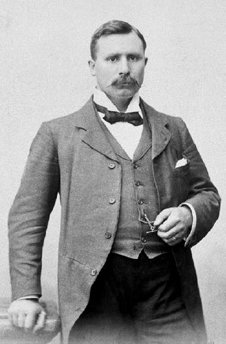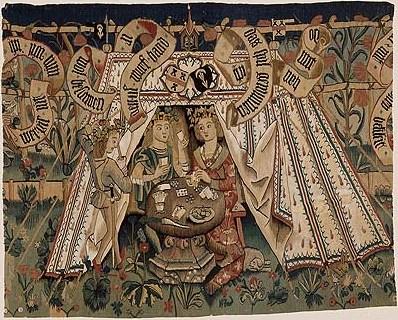|
Fritz Kater
Fritz Kater (12 December 1861 – 20 May 1945) was a German trade unionist active in the Free Association of German Trade Unions (FVdG) and its successor organization, the Free Workers' Union of Germany. He was the editor of the FVdG's organ '' Einigkeit'' and—after World War I—owner of the publishing houses Fritz Kater Verlag and Syndikalist. The son of a farmhand, Kater was born in 1861 in Barleben. His mother died when he was two years old. From the age of five, he had to work on the farm or at home in order to support his family. During his final two years in school, he also worked in a local sugar factory during the winter. Even after Kater started an apprenticeship as a mason, he still had to help his father on the farm as the elderly man was frequently ill. Only during the winter did Kater have spare time to read and educate himself. Fritz Reuter, a humorous poet who wrote in Low German, was his favorite writer. Kater joined the mason's trade union in Magdeb ... [...More Info...] [...Related Items...] OR: [Wikipedia] [Google] [Baidu] |
Barleben
Barleben is a municipality in the Börde district in Saxony-Anhalt, Germany. It is situated approximately 8 km north of Magdeburg. Twin towns — sister cities Barleben is twinned with: * Viimsi Parish Viimsi Parish ( et, Viimsi vald) is a rural municipality in Northern Estonia, located North-East and neighbouring the capital Tallinn. It occupies an area of with a population of 20 580 (). The municipality contains the Viimsi Peninsula and sev ..., Estonia References Börde (district) {{Börde-geo-stub ... [...More Info...] [...Related Items...] OR: [Wikipedia] [Google] [Baidu] |
Socialism
Socialism is a left-wing economic philosophy and movement encompassing a range of economic systems characterized by the dominance of social ownership of the means of production as opposed to private ownership. As a term, it describes the economic, political and social theories and movements associated with the implementation of such systems. Social ownership can be state/public, community, collective, cooperative, or employee. While no single definition encapsulates the many types of socialism, social ownership is the one common element. Different types of socialism vary based on the role of markets and planning in resource allocation, on the structure of management in organizations, and from below or from above approaches, with some socialists favouring a party, state, or technocratic-driven approach. Socialists disagree on whether government, particularly existing government, is the correct vehicle for change. Socialist systems are divided into non-market and market f ... [...More Info...] [...Related Items...] OR: [Wikipedia] [Google] [Baidu] |
First International Syndicalist Congress
The First International Syndicalist Congress was a meeting of European and Latin American syndicalist organizations at Holborn Town Hall in London from September 27 to October 2, 1913. Upon a proposal by the Dutch National Labor Secretariat (NAS) and the British Industrial Syndicalist Education League (ISEL), most European syndicalist groups, both trade unions and advocacy groups, agreed to congregate at a meeting in London. The only exception was the biggest syndicalist organization worldwide, the French General Confederation of Labor (CGT). Nevertheless, the congress was held with organizations from twelve countries participating. It was marked by heated debate and constant disagreements over both tactics and principles. Yet, it succeeded in creating the International Syndicalist Information Bureau as a vehicle of exchange and solidarity between the various organizations and the '' Bulletin international du mouvement syndicaliste'' as a means of communication. It would be viewed ... [...More Info...] [...Related Items...] OR: [Wikipedia] [Google] [Baidu] |
Anarchosyndicalist
Anarcho-syndicalism is a political philosophy and anarchist school of thought that views revolutionary industrial unionism or syndicalism as a method for workers in capitalist society to gain control of an economy and thus control influence in broader society. The end goal of syndicalism is to abolish the wage system, regarding it as wage slavery. Anarcho-syndicalist theory generally focuses on the labour movement. Reflecting the anarchist philosophy from which it draws its primary inspiration, anarcho-syndicalism is centred on the idea that power corrupts and that any hierarchy that cannot be ethically justified must be dismantled. The basic principles of anarcho-syndicalism are solidarity, direct action (action undertaken without the intervention of third parties such as politicians, bureaucrats and arbitrators) and direct democracy, or workers' self-management. Anarcho-syndicalists believe their economic theories constitute a strategy for facilitating proletarian self-activity ... [...More Info...] [...Related Items...] OR: [Wikipedia] [Google] [Baidu] |
Reichstag (German Empire)
The Reichstag () of the German Empire was Germany's lower house of parliament from 1871 to 1918. Within the governmental structure of the Reich, it represented the national and democratic element alongside the federalism of the Bundesrat and the monarchic and bureaucratic element of the executive, embodied in the Reich chancellor. Together with the Bundesrat, the Reichstag had legislative power and shared in decision-making on the Reich budget. It also had certain rights of control over the executive branch and could engage the public through its debates. The emperor had little political power, and over time the position of the Reichstag strengthened with respect to the Bundesrat. Reichstag members were elected for three year terms from 1871 to 1888 and following that for five years. It had one of the most progressive electoral laws of its time: with only a few restrictions, all men 25 and older were allowed to vote, secretly and equally. The Reichstag met throughout the First Wo ... [...More Info...] [...Related Items...] OR: [Wikipedia] [Google] [Baidu] |
Demonstration (protest)
A political demonstration is an action by a mass group or collection of groups of people in favor of a political or other cause or people partaking in a protest against a cause of concern; it often consists of walking in a mass march formation and either beginning with or meeting at a designated endpoint, or rally, in order to hear speakers. It is different from mass meeting. Actions such as blockades and sit-ins may also be referred to as demonstrations. Demonstrations can be nonviolent or violent (usually referred to by participants as "militant"), or can begin as nonviolent and turn violent depending on the circumstances. Sometimes riot police or other forms of law enforcement become involved. In some cases, this may be in order to try to prevent the protest from taking place at all. In other cases, it may be to prevent clashes between rival groups, or to prevent a demonstration from spreading and turning into a riot. History The term has been in use since the mid-19th ce ... [...More Info...] [...Related Items...] OR: [Wikipedia] [Google] [Baidu] |
Association Of Independent Socialists
Association may refer to: *Club (organization), an association of two or more people united by a common interest or goal *Trade association, an organization founded and funded by businesses that operate in a specific industry *Voluntary association, a body formed by individuals to accomplish a purpose, usually as volunteers Association in various fields of study *Association (archaeology), the close relationship between objects or contexts. *Association (astronomy), combined or co-added group of astronomical exposures *Association (chemistry) *Association (ecology), a type of ecological community *Genetic association, when one or more genotypes within a population co-occur *Association (object-oriented programming), defines a relationship between classes of objects *Association (psychology), a connection between two or more concepts in the mind or imagination *Association (statistics), a statistical relationship between two variables *File association, associates a file with a so ... [...More Info...] [...Related Items...] OR: [Wikipedia] [Google] [Baidu] |
Social Democracy
Social democracy is a Political philosophy, political, Social philosophy, social, and economic philosophy within socialism that supports Democracy, political and economic democracy. As a policy regime, it is described by academics as advocating Economic interventionism, economic and social interventions to promote social justice within the framework of a liberal-democratic polity and a capitalist-oriented mixed economy. The protocols and norms used to accomplish this involve a commitment to Representative democracy, representative and participatory democracy, measures for income redistribution, regulation of the economy in the Common good, general interest, and social welfare provisions. Due to longstanding governance by social democratic parties during the post-war consensus and their influence on socioeconomic policy in Northern and Western Europe, social democracy became associated with Keynesianism, the Nordic model, the social-liberal paradigm, and welfare states within po ... [...More Info...] [...Related Items...] OR: [Wikipedia] [Google] [Baidu] |
Anarchism
Anarchism is a political philosophy and movement that is skeptical of all justifications for authority and seeks to abolish the institutions it claims maintain unnecessary coercion and hierarchy, typically including, though not necessarily limited to, governments, nation states, and capitalism. Anarchism advocates for the replacement of the state with stateless societies or other forms of free associations. As a historically left-wing movement, usually placed on the farthest left of the political spectrum, it is usually described alongside communalism and libertarian Marxism as the libertarian wing (libertarian socialism) of the socialist movement. Humans lived in societies without formal hierarchies long before the establishment of formal states, realms, or empires. With the rise of organised hierarchical bodies, scepticism toward authority also rose. Although traces of anarchist thought are found throughout history, modern anarchism emerged from the Enlightenment. ... [...More Info...] [...Related Items...] OR: [Wikipedia] [Google] [Baidu] |
Sunset Provision
In public policy, a sunset provision or sunset clause is a measure within a statute, regulation or other law that provides that the law shall cease to have effect after a specific date, unless further legislative action is taken to extend the law. Most laws do not have sunset clauses and therefore remain in force indefinitely, except under systems in which desuetude applies. Origin The roots of sunset provisions are laid in Roman law of the mandate but the first philosophical reference is traced in the laws of Plato. At the time of the Roman Republic, the empowerment of the Roman Senate to collect special taxes and to activate troops was limited in time and extent. Those empowerments ended before the expiration of an electoral office, such as the Proconsul. The rule ''Ad tempus concessa post tempus censetur denegata'' is translated as "what is admitted for a period will be refused after the period". The same rules were applied in the Roman emergency legislation. The fundamental ... [...More Info...] [...Related Items...] OR: [Wikipedia] [Google] [Baidu] |
Junker
Junker ( da, Junker, german: Junker, nl, Jonkheer, en, Yunker, no, Junker, sv, Junker ka, იუნკერი (Iunkeri)) is a noble honorific, derived from Middle High German ''Juncherre'', meaning "young nobleman"Duden; Meaning of Junker, in German/ref> or otherwise "young lord" (derivation of ''jung'' and ''Herr''). The term is traditionally used throughout the German-speaking, Dutch-speaking and Scandinavian-speaking parts of Europe. It was also used in the Russian Empire due to Baltic German influence, up until the Russian Revolution. The term is currently still in use by the Georgian Defense Forces for student officers of the National Defence Academy. Honorific title In Brandenburg, the ''Junker'' was originally one of the members of the higher ''Edelfrei'' ( immediate) nobility without or before the accolade. It evolved to a general denotation of a young or lesser noble, sometimes politically insignificant, understood as "country squire". Martin Luther disguised h ... [...More Info...] [...Related Items...] OR: [Wikipedia] [Google] [Baidu] |
.jpg)






